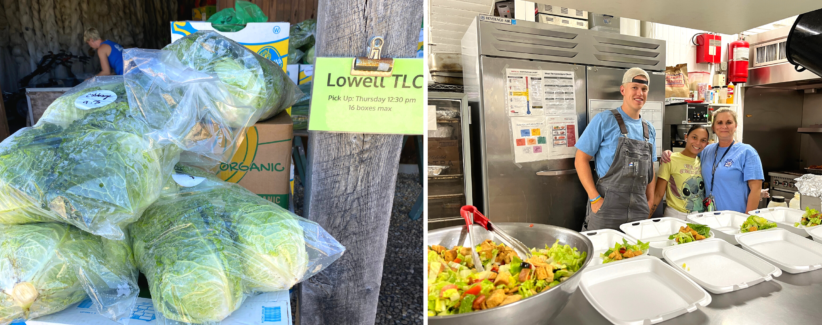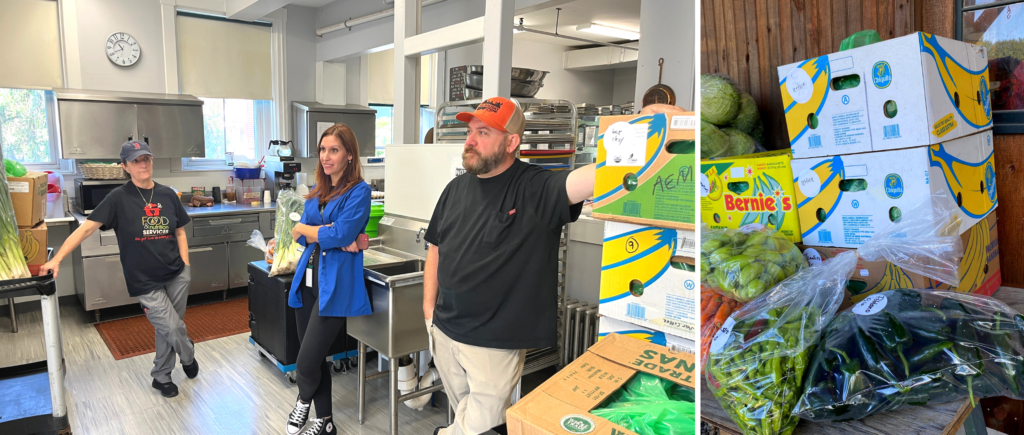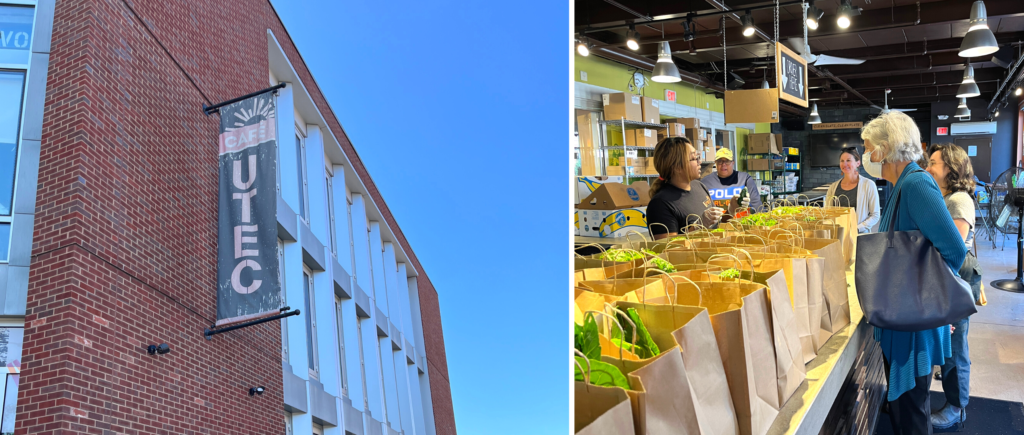From the Field: Freshness Matters, and Other Lessons from Partner Visits

When peak season subsides at Gaining Ground, we remain busy and productive—including making autumn visits to our hunger relief partners.
These 16+ organizations provide a connection between the farm and the community, by distributing organic produce from Gaining Ground to thousands of people experiencing food insecurity in Eastern Massachusetts.
September visits have included the Bedford Food Bank and three Lowell-based organizations: House of Hope, the Lowell Transitional Living Center, and UTEC, one of our newest partners. Each team provides a unique model for care, yet they are responding to a common crisis: historically high and rising rates of food insecurity.
These visits are part of the ongoing dialogue we share with partners to better understand the challenges they face, the needs they are meeting, and how we can serve them most effectively as a nonprofit farm.
Here is a snapshot of what we learned!
Freshness makes a difference
Whether a partner organization is distributing vegetables whole or preparing them in a scratch-cooked meal, they consistently let us know that the freshness of Gaining Ground produce goes a long way in nourishing the body and soul.
“We adore the texture, the taste,” said Café UTEC Manager Ginny, as she packed rows of brown bags with Gaining Ground lettuce, leeks, poblanos, and more.
Through a partnership with UTEC funded by the Greater Lowell Community Foundation, our produce goes into the nonprofit’s Madd Love Meals program: a free food distribution for more than 260 households per week.
The organization primarily serves young adults in Lowell facing the challenges of poverty, gang involvement, and unemployment. Yet since COVID, Assistant Director of Food Production Shambra McDowney said a broader population relies on UTEC for emergency food assistance—and folks can tell the difference between produce from the farm and produce from wholesale suppliers.
“They notice,” Shambra said.
Fruits, vegetables, and herbs from Gaining Ground are typically donated within 24 hours of harvest and 20 miles of the farm. For many partners, we’re the sole or primary source of fresh food.
“Restaurants pay a lot of money for vegetables like these,” said Paul Dubuque, chef at House of Hope in Lowell, who presented our team with Gaining Ground beets that he pickled for residents of the transitional shelter.
House of Hope was founded on Christmas Eve in 1985 to support single mothers and their children. Today Paul and the kitchen team—including a paid, part-time intern from the program—provide three scratch meals a day to 58 families. Fresh vegetables form the basis for dinners like stir fry, soup, fajitas, and tacos. At lunch time, Paul said, the kitchen “sides with the kids,” making healthy riffs on favorites like macaroni and cheese.

Need remains great, long after lockdown
Every partner we visited in September is serving many more people than they did in 2019. For instance, at the Bedford Food Bank, weekly distribution has gone up from 60 to 230 households, said Carla Olson, Healthy Communities Coordinator for the Town of Bedford.
On a recent Wednesday morning, Carla stood amid tables of paper bags bursting with fresh produce. The vast majority of these vegetables came from Gaining Ground, as other sources have had to cut their contributions of fresh ingredients. We are grateful to have contributed more than usual this year, by about 14% overall and 30% at the Bedford Food Bank.
Even so, Carla and our other partners said they can use more fresh food.
At the Lowell TLC—the city’s largest shelter for adults over 18—not only are more people showing up for services, but Triage Manager Jodie Dicks said that clients are trending older.
Some nights the nonprofit sleeps 40 or 50 people to its emergency bed program, and about 180 people attend meal service daily, for scratch-cooked breakfast, lunch, and dinner.
Food insecurity is part of a bigger picture
For many of our partners, food distribution fits into a larger, wraparound approach to human services that seeks to address injustice as its roots. Their efforts remind us that food security cannot really be separated from health, housing, immigration, income inequality, and basic human rights.
That’s why House of Hope provides 24-7 support to residents, including help with learning English, pursuing an education, securing work papers and finding a job, and so much more.
At Lowell TLC, residents of the dorms and affordable housing units are matched with case managers to help them achieve greater levels of stability, while navigating the challenges of addiction, mental illness, and poverty. And at UTEC, young adults in the workforce development program can access a continuum of services designed to break generational cycles of poverty.
“It has been very helpful for my family,” said Café UTEC Manager Ginny, as she prepared for the next day’s Madd Love Meals distribution.
Ginny herself went through the UTEC program, and her kids received a free early-childhood education in the same building, through UTEC’s 2Gen Center. Now her mother and sister receive a weekly Madd Love Meals box through UTEC’s partnership with the Cambodian Mutual Assistance Association, to serve people with disabilities.
“The fresh vegetables are the first thing my mom asks about,” Ginny said.
